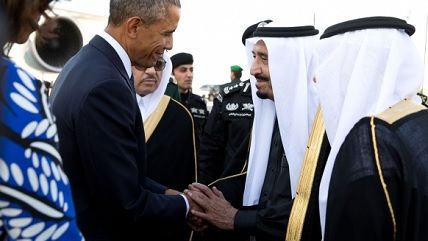Want to Fight the Terrorist Enemy? Start With Allies Like Saudi Arabia
Squashing terrorism without confronting its Sunni state incubators is like fighting a fire without plugging the gas leak.

It began, as these things usually do, with a carrot. After President Obama assailed Saudi Arabia for being a "free rider" in an interview with The Atlantic, Prince Turki al Faisal published a rejoinder at Arab News where he trumpeted Saudi-American cooperation. The message was clear: Lay off the criticism and we'll stand by you.
The stick came a month later. Stung by the introduction of a bill in Congress that would open their government to lawsuits from 9/11 victims, the Saudis threatened to divest in $750 billion of U.S. government assets. You expose us and we'll damage your economy. It was a superfluous move—Obama has already vowed to fight the legislation—and, for the typically reserved Saudis, an unusually brusque one. You might even call it geopolitical blackmail, which several of the 9/11 families did.
The Saudi-American friendship has hit a breaking point. That's partially because of the nuclear deal with Iran, which Saudi Arabia views with suspicion. But it's also because American policymakers are waking up to an uncomfortable reality: the conflict with terrorist groups like al Qaeda is, in many ways, a conflict with a network of terror enablers deep inside Saudi Arabia.
The Saudi state was born from a synthesis between the ruling House of Saud and fearsome Wahhabi warriors. The resulting government was predicated on Wahhabism, a puritanical form of Islam with a Spartan interpretation of Sharia that became codified in Saudi law. After the Islamic Revolution in 1979, the Saudis brandished Wahhabism as a weapon to counter Iran's newly mobilized Shiite fundamentalism. Better to export their extremism to other countries than lose control of it at home.
The Saudis claim they're fighting terrorism, and to an extent they are, executing al Qaeda militants within their borders and sharing intelligence with the United States. But at best, that's like Dr. Frankenstein in bleak pursuit of his monster after it's already gone on a rampage. For decades, Saudi donors fomented Sunni extremism in places like Pakistan, where hundreds of Shias have died in attacks, and Afghanistan, where funding went to Deobandi seminaries that would later influence the Taliban. There's a reason some Shias and other Muslim world minorities use the terms "Wahhabi" and "Sunni extremist" interchangeably. From their perspective, all IED-infested roads lead to Riyadh.
For America, the problem finally exploded on September 11, 2001, when the Twin Towers and Pentagon were attacked by a group of Islamic radicals, more than three quarters of whom were Saudi. The United States collaborated with Iran to defeat the Wahhabi-influenced Taliban in Afghanistan, and the subsequent 9/11 commission report was released with 28 blacked-out pages that its principal author now claims contain information about a major Saudi role. It seemed like the perfect time to confront Saudi Arabia and work to stem one of the world's worst terrorism generators.
Instead, we overthrew Saddam Hussein, who had only the most tenuous connection to al Qaeda, and ripped open a vacuum that would ultimately give birth to the Islamic State. Many of the Sunni extremists who poured across Iraq's borders were, of course, from Saudi Arabia, as well as other Arab powers like Jordan. Of the top five countries currently providing ISIS with recruits, three—Saudi Arabia, Jordan, and Turkey—are American allies.
Even in Yemen, where the Saudis claim to be fighting terrorism by leading an alliance of mostly Sunni countries against the Houthi rebels, there's something bigger afoot. Why did the Houthis rebel in the first place? In part, because Wahhabis from Saudi Arabia invaded Yemen during its 1994 civil war to aid the government, and since then have been blamed for discriminating against the Houthis' native north. The Saudis, once again, are confronting a problem that's partially of their own making.
Saudi Arabia was once a redoubtable opponent of the Soviet Union, and many foreign gurus are still reluctant to break out of that Cold War framework. Typical is the approach taken by Charles Krauthammer, who's written more than one column warning that America needs to constantly "reassure" its Sunni allies. But the world's lone superpower shouldn't placate countries that helped nurture our present enemies simply because they opposed our past enemies. Today, jihadists get more money from Saudi Arabia and its Gulf neighbors than anywhere else. That's a problem that can't go unanswered.
Squashing terrorism without confronting its Sunni state incubators is like fighting a fire without plugging the gas leak. That doesn't mean making the Saudis our enemies or launching another ill-considered military intervention, but it does mean pressuring them until they crack down on the jihad donors, rein in the Wahhabis, and reform school curricula that promote hateful nonsense about Jews and Christians.
We should do that no matter how many sticks they send our way. Want to defeat our terrorist enemies? Let's start with our allies.


Show Comments (45)